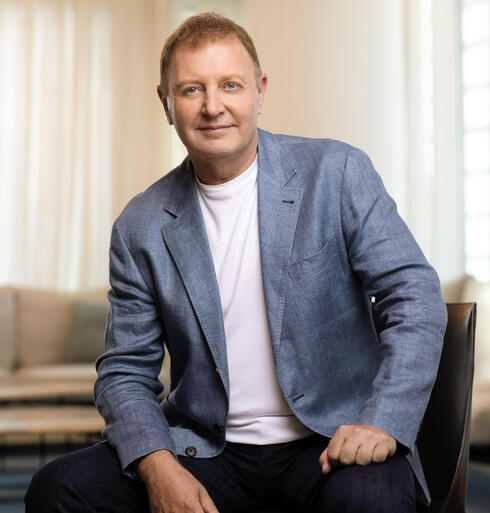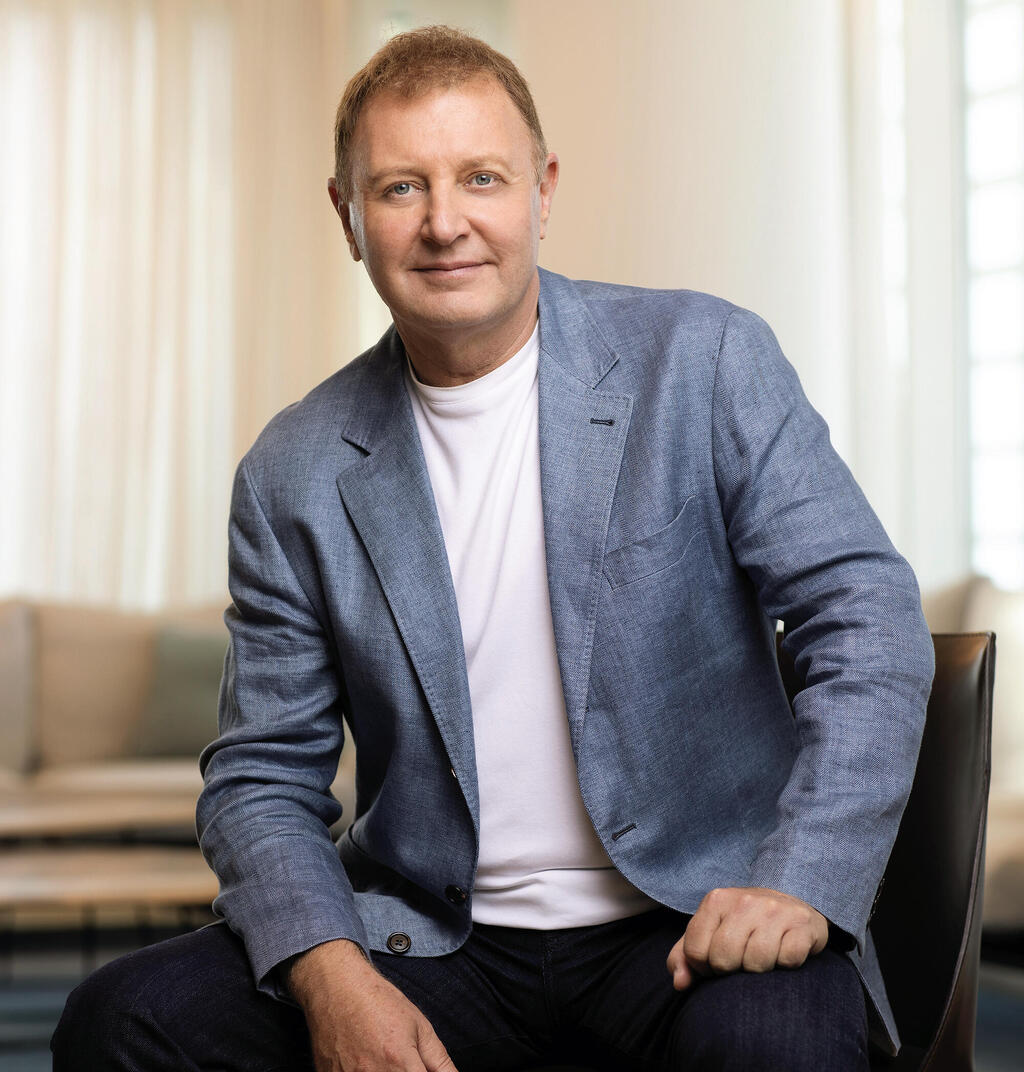
Mobileye co-founder: "I'm ashamed that I didn't know how serious the climate problem is"
Ziv Aviram discusses why he decided to establish a climate-tech fund with former US President Bill Clinton
Israeli tech mogul and co-founder of Mobileye Ziv Aviram announced last week the launching of a new climate fund called EcoBridge along with former U.S. President Bill Clinton. Calcalist sat down with Aviram for an in-depth interview to discuss what led him to this decision.
Given your entrepreneurial career, this is an interesting choice. Why climate tech?
"Four years ago, I founded the Aviram Foundation. Every year, we hold a competition among startups doing good for humanity in the Middle East and Africa. Many of the startups are working on climate-related issues. As I delve deeper into this topic, I am astonished by the magnitude of the crisis facing our generation. I look at the alarming data being published: millions may be forced to leave their homes if we don't do something, entire regions becoming uninhabitable due to extreme heat or rising sea levels, and more. I don't understand how everyone doesn't realize that we are facing the biggest and most acute problem humanity has ever encountered. We are talking about a catastrophe. You become exposed to it, learn about it, and become deeply involved. At some point, I even felt ashamed that I didn't know earlier how serious the problem is. I realized that I had to do something."
And how did these insights lead to the idea of creating the fund?
"My connections with the Clinton family helped me a lot in shaping the idea. We share a common language and similar ideas. They see climate as one of the most important issues and I know how to raise money and scale up companies globally, so, about a year ago, we started the fund. Clinton is on the board and is very involved and supportive. The other partners, Eytan Elbaz and Robert Citrone, have a background in philantrhopy. I hope this will give investors confidence that we will do things responsibly and effectively.
"We plan to raise between $1-2 billion for the fund, and invest in relatively mature companies that have scaling issues. My focus now is on investing in technologies that can move the needle; what we eat, what we grow, green energy, surplus fishing, surplus agriculture, deforestation, and plastics. Everything relates to the climate. We haven't defined the specific areas yet - it's so vast. You can't be an expert in everything. We'll likely focus on two or three areas and look for startups within them. We'll check which mature companies are in the field and whether they offer returns similar to what another investor would expect in their field. For me, it's philanthropy, but investors want a return on investment, and there are enough companies that can meet this criteria."
A return on investment can take time. Climate tech is still considered small and is heavily dependent on government policy. Do you trust that investors will have the necessary patience?
"We've been working on this for a long time. Many good funds, well-managed, are getting returns in climate tech similar to other areas. What will determine the sectors in which we invest is where we see enough companies that need help with scaling and substantial funding to grow, and where there's a chance for quick results. We need to ensure the fund is profitable. I will invest all my passion and energy in its success."
Despite the current economic crisis, the climate tech sector continued to grow last year. The amount of assets managed by climate-focused funds doubled from $30 billion in 2021 to about $64 billion in 2022. Do you think more investors are overcoming their fear of large investments in the sector, despite the high risk?
"The amount of investment in the climate sector is increasing. A lot of money went to funds that invest 20% in climate-related areas. It's a new market, and the challenge is to find the right companies that can show results in reasonable time frames. Mobileye, which I led, took 20 years to grow. We don't have 20 years; in another two decades there will be a catastrophe. We need to channel significant funds into this field. In the meantime, I'm getting amazing responses.”
How is the current crisis in the tech industry affecting the ability to develop technologies or invest in climate tech?
"Any crisis is bad for startups or new companies. It's a bit of a reset from the previous frenzy, which was an anomaly. In my career, I've experienced four financial crises. It's not the best environment and atmosphere, but during the boom years there was cheap money being invested in unworthy companies with unrealistic valuations. There's still money to be invested and investors looking for companies that will succeed. Crises in the modern era have also become shorter; this crisis will be shorter, and will provide opportunities. We'll find them. There are companies with lower valuations, but they have genuine, groundbreaking technology, and we can help them now."
Israel’s reputation has advanced in fields like cybersecurity, which are central in the IDF (Israel Defense Forces). Climate is not one of these fields. Do we have the ability to create an ecosystem that can compete globally?
"Israel is the father of high-tech in an insane way; the world doesn't see it. In Israel, we have brain power, culture, energy, and initiative. We have Israeli chutzpah, lack a fear of failure, and have a willingness to try again - we just need to create the motivation. Many other places lack this. It's not for nothing that there are so many startups in Israel. The fund we've established is global, but my dream is that the news of revolutionary solutions will come from Israel. Israel is my home, and we are looking for partnerships here. If entrepreneurs and investors set an example and say, 'We are investing,' there will be more and more partnerships. You have to start somewhere. I hope my significant investment in the field will also inspire others. When we started Mobileye, there were zero automotive companies in Israel. Today, there are 2,000. We can make a difference, we can drive change.
"I look at holistic solutions. In the new fund, we will invest in mature companies, but the Aviram Foundation also invests in the younger generation, the future of startups. We’ve taken over the topic of sustainability at Reichmann University. After speaking with some students about climate, they decided to focus on studying sustainability. It's a process, but we need to start somewhere."
The U.S. and Europe are currently investing a lot of money in climate solutions, while Israel barely has. Can an ecosystem grow in a sector that is almost absent in the country?
"Climate is a broad subject. There are areas that will develop after significant government investments. Some areas are already self-sustaining. If countries don't commit and invest budgets to drive major processes like green energy, nothing will happen. It requires a coalition of many bodies – government, regulators, scientists, the business community, and the media – to influence public opinion and push the government. If it becomes something that the majority supports, we will move forward. Initiatives like this make people say, 'Wait, maybe we should act too.' We need to start somewhere."
In the meantime, we see that politicians worldwide are failing to take action and haven't been able to cut greenhouse gas emissions enough to stop temperatures from rising.
"Politicians perform rather than act. States aren’t meeting the commitments they made in the climate agreements in Paris or Glasgow. Of course, there is lobbying by companies who benefit from pollution. The major polluters blind us to the real problem. Those who 30 years ago denied the harms of smoking, now deny the climate issue. But when the public gets involved and demands it, [politicians] will start to understand that it's not a game. We need to strengthen our awareness as consumers of the damage to the environment, and label products so that it's clear how much each product contributes to pollution."
What are your expectations of the Israeli government?
"I would be very happy if the government of Israel, which is my home, makes this a bigger priority. I want every country to do this. We didn't get any government assistance in Mobileye. Governments should not interfere as long as the ecosystem itself encourages entrepreneurship."
There are many foundations that talk about climate-tech but raise money from oil companies, even though these companies are among the most responsible for greenhouse gas emissions and have spent years sowing doubt, denying science, and obstructing solutions. Will you raise money from dirty companies?
"I want to leverage greenwashing for the greater good. If you tell polluting companies to 'invest in companies that help solve the problem,' then, from their perspective, it's greenwashing, but they still invest money. Of course, there are lobbies, a war for public opinion, etc. But you can't sweep the problem under the rug anymore. Climate change is getting worse and worse. People are dying from this situation. I definitely plan to raise money from oil companies. The major polluters are my first target."
Will you fly to this year's Global Climate Summit? There's criticism that these summits are more like festivals that allow politicians to gain recognition even if they don't take action. This year, the summit's president is the CEO of Dubai's national oil company.
"Definitely. We are planning to attend the conference with a large delegation. We will be there, try to make our voices heard, listen, and meet with people. It has become my central issue, and most of my efforts will be invested in this. This will be my first participation in the Climate Summit. We need to talk and raise awareness. In the end, it has an impact. What's the alternative? Doing nothing because someone else isn't acting? I don't see any other way."














